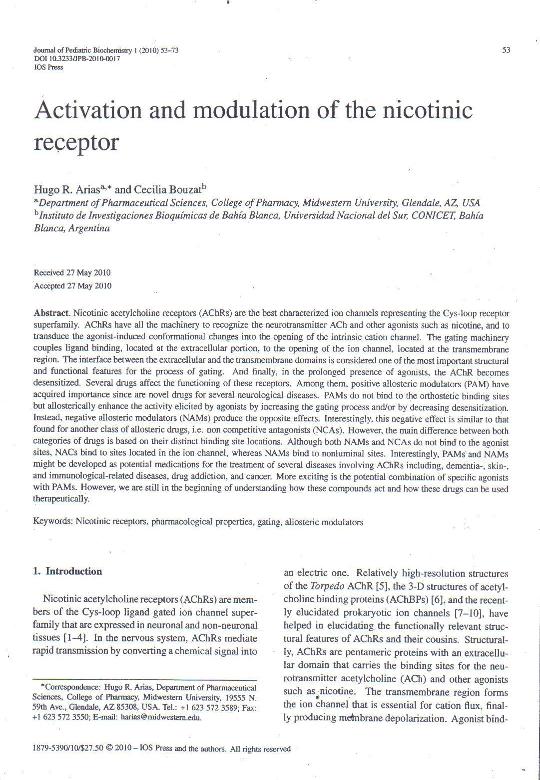Mostrar el registro sencillo del ítem
dc.contributor.author
Arias, Hugo Rubén

dc.contributor.author
Bouzat, Cecilia Beatriz

dc.date.available
2018-04-16T14:45:59Z
dc.date.issued
2010-05-27
dc.identifier.citation
Arias, Hugo Rubén; Bouzat, Cecilia Beatriz; Activation and modulation of the nicotinic receptor; IOS Press; Journal of Pediatric Biochemistry; 1; 2; 27-5-2010; 53-73
dc.identifier.issn
1309-2359
dc.identifier.uri
http://hdl.handle.net/11336/42109
dc.description.abstract
Nicotinic acetylcholine receptors (AChRs) are the best characterized ion channels representing the Cys-loop receptor superfamily. AChRs have all the machinery to recognize the neurotransmitter ACh and other agonists such as nicotine, and to transduce the agonist-induced conformational changes into the opening of the intrinsic cation channel. The gating machinery couples ligand binding, located at the extracellular portion, to the opening of the ion channel, located at the transmembrane region. The interface between the extracellular and the transmembrane domains is considered one of the most important structural and functional features for the process of gating. And finally, in the prolonged presence of agonists, the AChR becomes desensitized. Several drugs affect the functioning of these receptors. Among them, positive allosteric modulators (PAM) have acquired importance since are novel drugs for several neurological diseases. PAMs do not bind to the orthostetic binding sites but allosterically enhance the activity elicited by agonists by increasing the gating process and/or by decreasing desensitization. Instead, negative allosteric modulators (NAMs) produce the opposite effects. Interestingly, this negative effect is similar to that found for another class of allosteric drugs, i.e. non competitive antagonists (NCAs). However, the main difference between both categories of drugs is based on their distinct binding site locations. Although both NAMs and NCAs do not bind to the agonist sites, NACs bind to sites located in the ion channel, whereas NAMs bind to nonluminal sites. Interestingly, PAMs and NAMs might be developed as potential medications for the treatment of several diseases involving AChRs including, dementia-, skin-, and immunological-related diseases, drug addiction, and cancer. More exciting is the potential combination of specific agonists with PAMs. However, we are still in the beginning of understanding how these compounds act and how these drugs can be used therapeutically.
dc.format
application/pdf
dc.language.iso
eng
dc.publisher
IOS Press

dc.rights
info:eu-repo/semantics/openAccess
dc.rights.uri
https://creativecommons.org/licenses/by-nc-sa/2.5/ar/
dc.subject
Nicotinic Receptors
dc.subject
Pharmacological Properties
dc.subject
Gating
dc.subject
Allosteric Modulaters
dc.subject.classification
Inmunología

dc.subject.classification
Medicina Básica

dc.subject.classification
CIENCIAS MÉDICAS Y DE LA SALUD

dc.title
Activation and modulation of the nicotinic receptor
dc.type
info:eu-repo/semantics/article
dc.type
info:ar-repo/semantics/artículo
dc.type
info:eu-repo/semantics/publishedVersion
dc.date.updated
2018-04-12T14:24:38Z
dc.identifier.eissn
1879-5404
dc.journal.volume
1
dc.journal.number
2
dc.journal.pagination
53-73
dc.journal.pais
Países Bajos

dc.journal.ciudad
Amsterdam
dc.description.fil
Fil: Arias, Hugo Rubén. Midwestern University; Estados Unidos
dc.description.fil
Fil: Bouzat, Cecilia Beatriz. Consejo Nacional de Investigaciones Científicas y Técnicas. Centro Científico Tecnológico Conicet - Bahía Blanca. Instituto de Investigaciones Bioquímicas de Bahía Blanca. Universidad Nacional del Sur. Instituto de Investigaciones Bioquímicas de Bahía Blanca; Argentina
dc.journal.title
Journal of Pediatric Biochemistry
dc.relation.alternativeid
info:eu-repo/semantics/altIdentifier/url/https://content.iospress.com/articles/journal-of-pediatric-biochemistry/jpb00017
dc.relation.alternativeid
info:eu-repo/semantics/altIdentifier/doi/http://dx.doi.org/10.1055/s-0036-1586372
Archivos asociados
